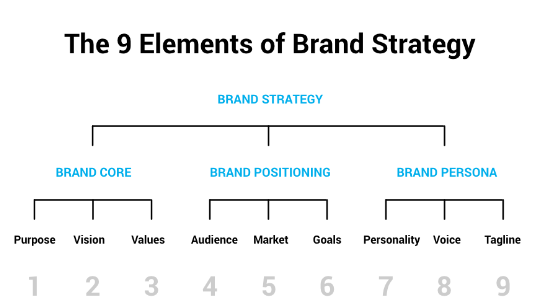In today’s fiercely competitive business landscape, where countless companies vying for consumers’ attention. The importance of branding has never been more pronounced. At its core, branding transcends mere logos and taglines. It represents the essence of a company’s identity, values, and promise to its customers. Effective branding not only distinguishes a business from its competitors but also fosters deep connections with consumers, engendering trust, loyalty, and advocacy. In this era of digital connectivity and constant communication, a strong brand presence is indispensable for businesses seeking to carve out a distinct position in the market and drive sustainable growth. Understanding the power and Significance of Branding requires a comprehensive examination of its multifaceted components and far-reaching implications.
From crafting compelling brand stories to cultivating consistent brand experiences across all touchpoints, businesses must navigate a complex landscape of consumer perceptions, market dynamics, and competitive pressures. In this introductory exploration, we embark on a journey to unravel the intricacies of branding, exploring its significance, key components, and strategies for building a strong and enduring brand presence in today’s dynamic business environment.
Understanding The Significance of Branding:

At its core, Significance of Branding is about more than just logos and slogans; it’s about shaping perceptions, building relationships, and creating emotional connections with consumers. Effective branding begins with a deep understanding of a company’s values, mission, and unique identity. It’s about articulating what sets a business apart from competitors and communicating that distinctiveness compellingly and memorably. Whether it’s through visual elements like logos and color schemes or through messaging and storytelling, branding serves as the foundation upon which a company’s reputation and identity are built.
Furthermore, branding extends beyond the products or services a company offers to encompass every interaction and touchpoint that a customer has with the brand. From the moment a customer encounters a brand’s marketing materials to the post-purchase experience, each interaction shapes their perception of the brand and influences their likelihood of becoming a loyal customer. By delivering consistent and authentic brand experiences at every touchpoint, businesses can establish trust and credibility with their audience, fostering long-term loyalty and advocacy.
Ultimately, effective branding is about creating a connection. A shared understanding and emotional resonance. That transcends the transactional nature of business. It’s about building a sense of trust, familiarity, and loyalty that keeps customers coming back time and time again. In today’s crowded marketplace, where consumers are bombarded with choices, a strong and cohesive brand identity can serve as a beacon, guiding consumers through the noise and helping them make informed purchasing decisions based on their values and preferences.
The Power of Perception:

In today’s highly competitive business landscape, where consumers have more choices than ever before, branding plays a crucial role in shaping consumer perceptions and preferences. A strong brand identity not only differentiates a company from its competitors but also instills confidence and credibility in the minds of consumers. Whether consciously or subconsciously, consumers are drawn to brands that they perceive as trustworthy, reliable, and authentic. By consistently delivering on their brand promise and upholding their values, companies can cultivate positive perceptions and foster strong emotional connections with their target audience.
Moreover, the Significance of Branding influences consumer behavior and purchasing decisions in profound ways. A well-established brand with a positive reputation is more likely to attract new customers and retain existing ones, driving repeat business and fostering brand loyalty. Consumers often gravitate towards brands that align with their values and aspirations, seeking out products and services that reflect their identity and lifestyle. By effectively communicating its values and resonating with its target audience, a brand can create a sense of belonging and community, fostering long-term relationships with its customers.
In essence, branding is about creating meaning and significance in the minds of consumers. It’s about telling a story, evoking emotions, and building connections that transcend the functional attributes of products or services. By understanding the power of perception and leveraging it to their advantage, businesses can differentiate themselves in the marketplace, drive customer loyalty, and ultimately achieve sustainable growth and success.
Building Brand Equity:

Brand equity is the culmination of years of strategic branding efforts aimed at building trust, loyalty, and recognition among consumers. It represents the intangible assets and perceptions associated with a brand, including its reputation, goodwill, and market value. Businesses that invest in building strong brand equity enjoy numerous benefits, including increased customer loyalty, higher price premiums, and greater resilience to market fluctuations. Moreover, brand equity serves as a valuable asset that can drive future growth and expansion opportunities, enabling businesses to maintain a competitive edge in their respective industries.
One of the key drivers of brand equity is brand consistency. Ensuring that every interaction and touchpoint with the brand reinforces its core values and identity. Consistency builds trust and credibility with consumers, reinforcing their positive perceptions of the brand over time. Additionally, brands that consistently deliver exceptional customer experiences and uphold their promises earn the loyalty and advocacy of customers, further enhancing brand equity.
Furthermore, brand equity serves as a protective barrier against competitive threats and market volatility. Brands with strong brand equity are more resilient to negative publicity or crises, as consumers are more likely to give them the benefit of the doubt and remain loyal in the face of challenges. Additionally, brand equity provides a foundation for future growth and expansion, enabling brands to command higher prices, attract top talent, and enter new markets with confidence. Overall, building brand equity is a strategic investment that pays dividends in terms of long-term value creation and sustainable business success.
Key Components of Effective Branding:

Successful branding is built on a foundation of clarity, consistency, and authenticity. It begins with a deep understanding of the target audience and market dynamics, allowing businesses to tailor their brand message and positioning to resonate with consumer needs and aspirations. A compelling brand identity encompasses elements such as a memorable logo, distinctive visual assets, and a cohesive brand voice that reflects the company’s values and personality. Consistency across all brand touchpoints, from advertising and marketing materials to customer service interactions, reinforces brand recognition and strengthens consumer perceptions over time. Additionally, authenticity and transparency are paramount in today’s era of social media and heightened consumer scrutiny, as consumers increasingly seek genuine connections with brands that align with their values and beliefs.
Strategies for Building a Strong Brand Presence:
Building a strong brand presence requires a holistic approach that integrates various marketing and branding strategies. Content marketing, for example, allows businesses to share their brand story and expertise with consumers through engaging and informative content across channels such as blogs, social media, and videos. Social media platforms provide valuable opportunities for brands to engage with their audience in real time, fostering meaningful interactions and building a community around shared interests and values. Influencer partnerships and collaborations offer another avenue for brands to amplify their reach and credibility, leveraging the influence and trust of prominent individuals or organizations within their industry. Additionally, investing in customer experience initiatives, such as personalized service and seamless omnichannel experiences, can enhance brand loyalty and advocacy by creating positive interactions at every touchpoint.
Conclusion:
In conclusion, branding is not just a marketing tactic—it’s a strategic imperative for businesses looking to thrive in today’s competitive marketplace. A strong brand identity sets the foundation for building trust, loyalty, and lasting relationships with customers, driving growth and success in the long term. By investing in strategic branding initiatives that align with their values and resonate with their target audience, businesses can create enduring connections that stand the test of time. As the marketplace continues to evolve, the importance of branding will only grow, making it essential for businesses to prioritize and invest in building a strong and memorable brand presence. With careful planning, consistent execution, and a deep understanding of their target audience, businesses can unlock the full potential of branding to achieve their goals and aspirations.













